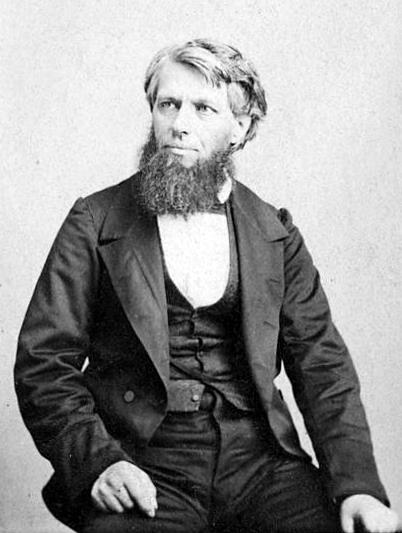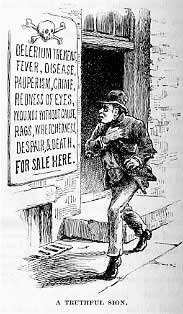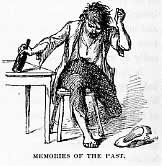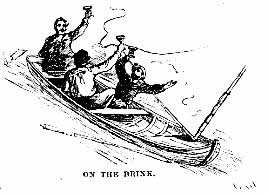 |
The
Dangers of Moderate Drinking
By
John B. Gough
John
B. Gough (1817-1886) Born in Sandgate, Kent, England in 1817,
Gough immigrated to the United States when he was only twelve years
old. His mother and sister also came to America. His mother died of
a stroke
and Gough, despondent, began to drink. He married in 1838. The couple
had a daughter but unfortunately, both mother and child died within
days of each other. By the age of 25, Gough was unemployed, homeless,
and
a confirmed drunkard. In 1842 he attended a temperance meeting in Worcester,
Massachusetts,
where he took a pledge to totally abstain from liquor. He began to
tell his story to eager audiences and soon embarked on a career of
lecturing
against the evils of drink. During his career, Gough delivered some
9,600 lectures to more than nine
million people in America, Canada, England, Scotland, and Ireland.
When
he died in 1886, the New York Times wrote that he "was probably
better known in this country and in Great Britain than any other
public speaker." Mr. Gough was one of this country’s most
influential social reformers who helped to solve one of America’s
most pressing problems. He was a witnessing Christian, a personal
friend of Charles Spurgeon, and shared the
pulpit in Boston (1877) during a "Temperance Day" meeting with D. L.
Moody.
For more info, see the Wikipedia entry for John B. Gough |
 One favorite
argument of young men in reference to the use of intoxicating drink is, "When I
find out that it is doing me an injury, then I will give it up." That is
making an admission and coming to a conclusion.
One favorite
argument of young men in reference to the use of intoxicating drink is, "When I
find out that it is doing me an injury, then I will give it up." That is
making an admission and coming to a conclusion.
The admission is true; the conclusion
is false. You admit it may injure you, and when it has injured you, then
you will quit it. You won't use such an argument in reference to any other
matter. "I will put my hand into the den of a rattlesnake, and when I find
out that he has stuck his fangs into me I will draw it out and get it cured
as quickly as possible." There
is no common sense in that.
Young men, beware of this thing,
because it is a snare. It is fearfully deceptive. Every man who drinks intends
to be a moderate drinker. I have said this over and over again, because I
believe it to be important. Every man who becomes intemperate does so by a
course of
argument from
the beginning all the way down to ruin. Young men, you say, "When I find out that it is injuring
me, then I will give it up." Is that sensible?
I once heard of a pilot who said
he could pilot a vessel into Boston Harbor. "Now," said he to the
captain, "I'll stand 'midships, and you can take the helm. I know every rock in this channel -
every one of 'em - I know 'em all, and I'll give you warning." By and by the vessel struck upon a
rock, and the shock threw everybody down upon the deck. The poor pilot got up, rubbing
himself, and said, "Captain, there's one of 'em."
Now we say to young men, "There 's one of them. Hard up your helm before you strike!" That is
sensible. If you have struck, haul off and repair damages, and then strike again. Is that
sensible? In time the poor old battered hulk will not bear any more damages, and men will bury
you, a broken wreck. That is the end of it in many cases. "When I find out that it is injuring
me, then I will give it up." Gather all the drunkards of this country together, and ask them
every one, "Are you drinking enough to injure you?" A large proportion will
declare that they are not. Each one of them has become a drunkard in the
sight of God and man before he has
become one in his own estimation.
 Intoxicating
drink is deceptive in its very nature. It reminds me of the fable of the serpent
in a circle of fire. A man was passing
by, and the snake said to him, "Help me out of my difficulty." "If I do,
you'll bite me." "Oh, no, I won't." "I'm afraid to trust you," "Help me out
of the fire, or it will consume me, and I promise on my word of honor I won't
bite
you." The man took the snake out of
the fire, and threw it on the ground. Instantly the serpent said, "Now I'll
bite you." "But didn't
you promise me you wouldn't?" "Yes, but don't you know it's my nature to
bite, and I cannot help it." So it is with the drink. It is its nature to
bite; it is its nature to deceive.
Intoxicating
drink is deceptive in its very nature. It reminds me of the fable of the serpent
in a circle of fire. A man was passing
by, and the snake said to him, "Help me out of my difficulty." "If I do,
you'll bite me." "Oh, no, I won't." "I'm afraid to trust you," "Help me out
of the fire, or it will consume me, and I promise on my word of honor I won't
bite
you." The man took the snake out of
the fire, and threw it on the ground. Instantly the serpent said, "Now I'll
bite you." "But didn't
you promise me you wouldn't?" "Yes, but don't you know it's my nature to
bite, and I cannot help it." So it is with the drink. It is its nature to
bite; it is its nature to deceive.
Young men say (and I have heard
them more than once) that they "must sow their wild oats."
Remember this, young gentlemen, "Whatsoever a man soweth, that shall he also reap." If you
sow corn, you reap corn. If you sow weeds, you reap weeds. If you sow to the flesh, you will of
the flesh reap corruption. But if you sow to the spirit, you will of the spirit reap life
everlasting. Ah, young men, look at that reaping, and then contemplate the awful reaping of men
to-day who are reaping as they have sown, in bitterness of spirit and anguish of soul. "When
I find out that it is injuring me, Then I will give it up."
Surely that is not common sense.
Such is the fascination thrown around a man by the power of this habit, that
it must have essentially injured him before he will acknowledge the hurt
and consent to give it up. Many a man has been struck down in his prosperity,
has
been sent to
prison for crime, before he acknowledged that his evil habit was injuring
him. I remember riding from Buffalo to Niagara Fails, and I said to a gentleman, "What
river is that, sir?"
"That," he said, "is Niagara River." "It is a beautiful stream," said I, "bright,
smooth, and glassy; how far off are the rapids?" " Only a few miles," was the
reply. "Is
it possible that only a few miles from us we shall find the water
in the turbulence which it must show when near the rapids?" "You will find
it so, sir."
And so I found it, and that first sight of Niagara Falls I shall never forget.
Now, launch your bark on that river; the water is smooth, beautiful, and glassy.
There is a ripple at the bow of
your boat, and the silvery wake it leaves behind adds to your enjoyment. You
set out on your pleasure excursion. Down the stream you glide; oars, sails,
and helm in proper trim. Suddenly
some one cries out from the bank, "Young men, ahoy!"
 "What
is it?"
"What
is it?"
"The rapids are below you."
"Ha, ha! we have heard of the rapids, but we are not
such fools as to get into them. When we find we are going too fast, then we
shall up with the helm and steer to the shore; we will set the mast
in the socket, hoist the sail, and speed to land. Then on, boys, don't be alarmed,
there's no danger." "Young men, ahoy there! " "What is it?" "The rapids are
below you." "Ha, ha? we will
laugh and, quaff; all things delight us. What care we for the future? No man
ever saw it. Sufficient for the day is the evil thereof. We will enjoy life
while we may; we will catch
pleasure as it flies. This is enjoyment, time enough to steer out of danger
when we are sailing too swiftly with the current." "Young men, ahoy!" "What
is it?" "Beware, beware! the rapids
are below you." Now you feel them! See the water foaming all around! See
how fast you pass that point! Up with the helm!
Now turn! Pull hard; quick, quick! Pull for your lives! Pull till the blood
starts
from the nostrils and
the veins stand like whipcord upon the brow. Set the mast in the socket,
hoist the
sail! Ah, ah, it is too late; faster and faster you near the awful cataract,
and then, shrieking, cursing, howling, praying, over you go. Thousands launch
their barks in smooth water and
realize no danger till on the verge of ruin, boasting all the while to the
last, "When I find out that it is injuring me, then I will give it up." The
power of this habit, I repeat, is fascinating, is deceptive, and men may
go on arguing and coming to conclusions while on the way down to
destruction.
--Taken from Platform
Echoes, John B. Gough. Pages 93-97, 1886.
Back to Biblebelievers.com

 One favorite
argument of young men in reference to the use of intoxicating drink is, "When I
find out that it is doing me an injury, then I will give it up." That is
making an admission and coming to a conclusion.
One favorite
argument of young men in reference to the use of intoxicating drink is, "When I
find out that it is doing me an injury, then I will give it up." That is
making an admission and coming to a conclusion. Intoxicating
drink is deceptive in its very nature. It reminds me of the fable of the serpent
in a circle of fire. A man was passing
by, and the snake said to him, "Help me out of my difficulty." "If I do,
you'll bite me." "Oh, no, I won't." "I'm afraid to trust you," "Help me out
of the fire, or it will consume me, and I promise on my word of honor I won't
bite
you." The man took the snake out of
the fire, and threw it on the ground. Instantly the serpent said, "Now I'll
bite you." "But didn't
you promise me you wouldn't?" "Yes, but don't you know it's my nature to
bite, and I cannot help it." So it is with the drink. It is its nature to
bite; it is its nature to deceive.
Intoxicating
drink is deceptive in its very nature. It reminds me of the fable of the serpent
in a circle of fire. A man was passing
by, and the snake said to him, "Help me out of my difficulty." "If I do,
you'll bite me." "Oh, no, I won't." "I'm afraid to trust you," "Help me out
of the fire, or it will consume me, and I promise on my word of honor I won't
bite
you." The man took the snake out of
the fire, and threw it on the ground. Instantly the serpent said, "Now I'll
bite you." "But didn't
you promise me you wouldn't?" "Yes, but don't you know it's my nature to
bite, and I cannot help it." So it is with the drink. It is its nature to
bite; it is its nature to deceive. "What
is it?"
"What
is it?"